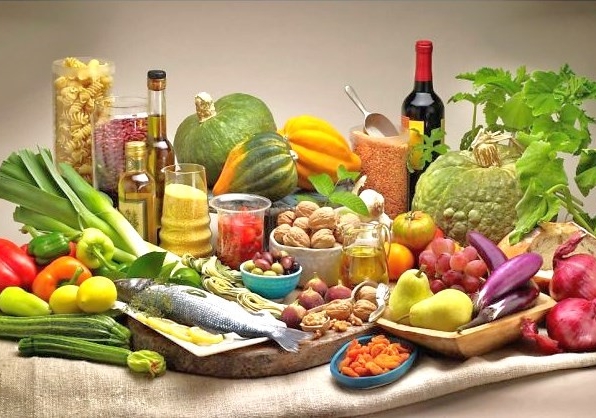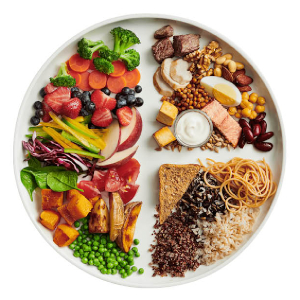If you could know the precise moment of your death, would you want to? That’s a question that’s often asked among cocktail party-goers as a means of ‘breaking the ice’. It’s traditionally been great for that purpose, because nobody has had any way of knowing when they’ll snuff it.
 The Mediterranean Diet: Condensed version of the ‘Green Group’ foods from
The Mediterranean Diet: Condensed version of the ‘Green Group’ foods from
the UofM study on the effects of foods on health and longevity…
But now, scientists at the University of Michigan (UofM) have devised a way to calculate how many minutes eating certain foods can add – or deduct – from your life. For example, for every Hot Dog you eat, you shorten your life by 36 minutes. And for every serving of nuts, you lengthen your life by 26 minutes. Sounds like crystal ball gazing? Voodoo? Well, it’s the real deal. So they say…
What they did
Researchers working under team leader Dr. Katerina Stylianou (as part of her doctoral thesis) evaluated more than 5,800 foods to determine their nutritional disease burden to humans and their impact on the environment.
According to an abstract of the study report: “[T]he researchers utilized IMPACT World+, a method to assess the life cycle impact of foods (production, processing, manufacturing, preparation/cooking, consumption, waste), and added improved assessments for water use and human health damages from fine particulate matter formation. They developed scores for 18 environmental indicators taking into account detailed food recipes as well as anticipated food waste.”
The work is based on a new epidemiology-based nutritional index, the Health Nutritional Index, which the investigators developed in collaboration with nutritionist Victor Fulgoni III from Nutrition Impact LLC. HENI calculates the net beneficial or detrimental health burden in minutes of healthy life associated with a serving of food consumed.
Then, researchers organized the foods into three groups: Red for those that impacted health negatively, yellow for those which had a neutral effect, and green for those that had positive indications for health and, therefore, lifespan.
What they found
The study revealed that, “[S]ubstituting 10% of daily caloric intake from beef and processed meats for a mix of fruits, vegetables, nuts, legumes and select seafood could reduce your dietary carbon footprint by one-third and allow people to gain 48 minutes of healthy minutes per day.”
“Previous studies have often reduced their findings to a plant vs. animal-based foods discussion,” Stylianou notes. “Although we find that plant-based foods generally perform better, there are considerable variations within both plant-based and animal-based foods.”
The takeaway
Based on their findings, the researchers suggest:
- Decreasing foods with the most negative health and environmental impacts including high processed meat, beef, shrimp, followed by pork, lamb and greenhouse-grown vegetables.
- Increasing the most nutritionally beneficial foods, including field-grown fruits and vegetables, legumes, nuts and low-environmental impact seafood.
“The urgency of dietary changes to improve human health and the environment is clear,” says Olivier Jolliet, U-M professor of environmental health science and senior author of the paper. “Our findings demonstrate that small targeted substitutions offer a feasible and powerful strategy to achieve significant health and environmental benefits without requiring dramatic dietary shifts.”
My Take
I believe that the findings reflect the healthfulness – or not – of the foods studied. But I still have trouble accepting that any purely scientific study or combination of studies can accurately predict how long I’ll live, and how healthy I’ll be. And I also believe that the length of my life will depend on a much more complex formula including variables for exercise, happiness, stress and other hard-to-enumerate factors. But the UofM study does provide a handy Index of foods that can help us live healthier lives. (For the condensed version, see previous posts on the Mediterranean diet!)
Muse on that!
~ Maggie J.

